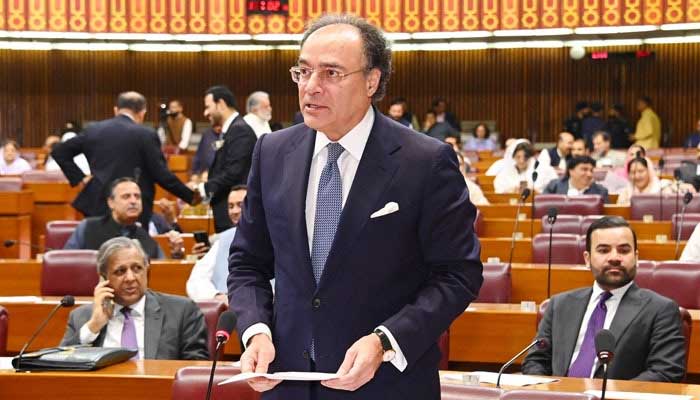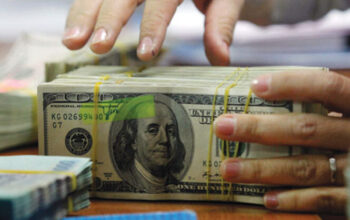By Staff Reporter
ISLAMABAD: Pakistan’s lower house of parliament approved a Rs17.57 trillion federal budget for the next fiscal year on Thursday, slashing spending by 7% while funneling nearly half the funds to debt servicing and boosting defense outlays by more than 20% after a sharp escalation in tensions with arch-rival India.
The National Assembly session, marked by coalition wrangling and opposition protests, adjourned until 11 a.m. Friday after passing the finance bill clause by clause with amendments.
The budget, totaling Rs17.57 trillion, lays bare Pakistan’s economic bind. Debt servicing eats up Rs8.21 trillion, almost half the outlay, leaving little room for growth initiatives as the government targets a fiscal deficit of 3.9% of GDP under a $7 billion IMF loan program sealed last year. Defense spending surges to Rs2.55 trillion, a more than 20% hike, reflecting fallout from May’s clash with India, the worst in nearly three decades.
The House passed the budget with certain amendments, giving effect to the federal government’s proposals for the financial year set to begin from July 1. Amendments to the Sales Tax Act, 1990, presented by Aurangzeb were approved by a majority vote in the House.
“The National Assembly has passed the federal budget for the next fiscal year, with a total outlay of 17,573 billion rupees, focusing on sustainable and inclusive economic growth,” state-run Radio Pakistan reported.
Finance Minister Muhammad Aurangzeb, who presented the budget on June 10, projects 4.2% economic growth despite a lackluster 2.6% this year, well below the 3.6% goal, hampered by sluggish agriculture and industry. Inflation is pegged at 7.5% for the coming year.
“Our commitment is to ensure that every budgetary decision serves the national interest and prioritizes the welfare of ordinary citizens,” said Pakistan Peoples Party (PPP) Chairman Bilawal Bhutto Zardari, a key coalition figure, during the debate.
The Federal Board of Revenue (FBR) shoulders a hefty burden, tasked with collecting Rs14.1 trillion of the Rs19.3 trillion in projected gross revenue, a 19% jump from last year. Aurangzeb unveiled ambitious plans to scale IT exports to $25 billion over five years and boost workers’ remittances to $38 billion by year-end.
To tighten tax compliance, amendments to the Sales Tax Act empower the finance committee to arrest traders for fraud exceeding Rs50 million, though the FBR’s arrest powers are barred during investigations. “The FBR will not have the power of arrest during the investigation stage,” the amendment specifies.
Other changes include tax exemptions for 107 institutions, ranging from lawyers’ associations to hospitals, under the Income Tax Ordinance, 2001. New rules mandate tax return proof for vehicle purchases over Rs7 million, property deals above Rs100 million, and securities investments topping Rs50 million.
The PPP, a linchpin in Prime Minister Shehbaz Sharif’s coalition, initially balked at the budget’s provisions. “The PPP voiced strong reservations over some aspects,” a party statement noted, but support came after the government adopted their proposals.
Bhutto Zardari hailed the outcome. “We appreciate the government’s efforts as BISP’s (Benazir Income Support Programme) budget has been increased.”
The BISP allocation soared by a record 20%, a move he called “commendable,” alongside a doubled tax exemption for salaried workers, to Rs1.2 million from Rs600,000, offering “major relief” to the middle class. A proposed solar panel tax was also halved by 50%. “We are grateful to the government and the prime minister for accepting our proposals,” Bhutto Zardari added.
Opposition amendments floundered against the coalition’s majority, though the National Assembly’s Standing Committee on Finance unusually tweaked the revised Finance Bill mid-process, a rarity in parliamentary proceedings.
Sharif praised his economic team, spotlighting Aurangzeb’s role in crafting the budget amid political turbulence. “I laud the economic team, particularly the finance minister, for their hard work,” he said, also thanking allies like the PPP. The federal cabinet, in a pre-vote meeting, greenlit the Finance Bill 2025 with amendments and formed a committee to tackle gas policy issues, with findings due for the Supreme Court.
A nod to austerity came via an amendment to the Salaries and Allowances Act, pegging ministers’ and ministers of state’s pay to that of parliament members. Current expenditure is set at Rs16,286 billion, down 5.33% from last year’s revised figures.
Copyright © 2021 Independent Pakistan | All rights reserved




